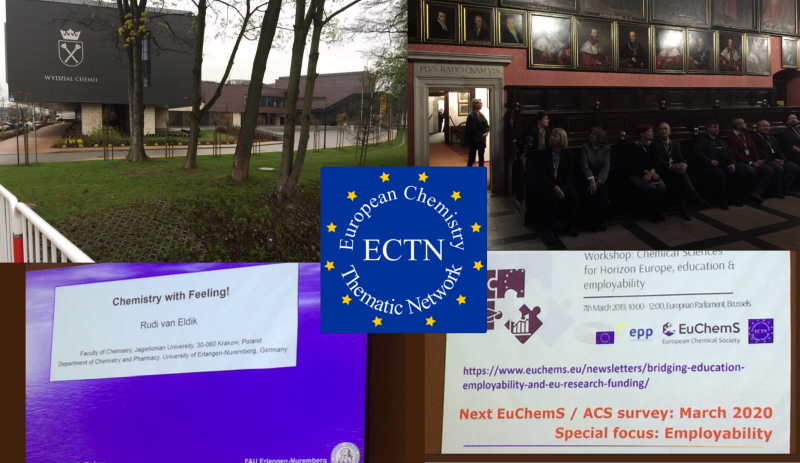
May 20, 2019 | News
The ECTN Association General Assembly was held at the Faculty of Chemistry, Jagiellonian University in Krakow, Poland on 13-14 April 2019 under the Presidency of Emmanuel Sinagra (University of Malta).
After a welcome from our hosts and a brief presentation of the Faculty of Chemistry at the Jagiellonian University, Prof. Rudi van Eldik (Faculty of Chemistry, Jagiellonian University and University of Erlangen_Nuremburg, DE) gave a very entertaining and thought provoking lecture entitled ‘Chemistry with Feeling’. Rudi van Eldik is very well known for his chemistry demonstration lectures that are extremely popular with both school and university students.
This was followed by a joint presentation by Natasa Brouwer (University of Amsterdam) and Iwona Maciejowska (Jagiellonian University) on the successes of the ECTN Work Group on Lecturing Qualifications and Innovative Teaching Methods. This group has produced an online course entitled ‘Teaching in University Science Laboratories’. In the second year of running this course in 2018 there were 144 participants of which 85 completed the course and gained the certificate. There is now a plan to make this available as a MOOC on Coursera, twice a year in September and February. More information will be available on the work group web pages on the ECTN website.
There followed a presentation of EChemTest statistics showing how the various pass levels for the tests have been arrived at and the advantages gained by moving the tests from the commercial QuestionMark programme to the Open Source EOL software developed at Perugia University. This has allowed us to create more Test Centres (there are now 16 and it is expected to increase to 18 in 2019) and there is no limit to the number of test sessions we can run.
At the General Assembly the following Committees and Work Groups held working sessions:
Chemistry Student Mobility and Database, Lecturing Qualifications and Innovative Teaching Methods, Chemistry in Everyday Life, Quality Standards in Teaching Committee, Joint and Multiple Degrees, and Activities for Students. The outcomes from these sessions can be found (or will be found shortly) on the Work Group or Committee webpages on www.ectn.eu.
At the business session of the Assembly, the President Emmanuel Sinagra ‘University of Malta) congratulated the Label Committee and Virtual Education Community Committee which are working very well and are responsible for attracting new members including the Universidad Mayor de San Andres, La Paz, Bolivia. Unfortunately their contact person was unable to attend the General Assembly due to last minute visa problems. However, we were able to show a video presenting the UMSA during our meeting. The UMSA is now an EChemTest Test Centre following a successful online training course for them, thanks to cooperation from Rey Juan Carlos University and Complutense University in Madrid.
Reiner Salzer is retiring from the position of Chair of the Label Committee. He was warmly thanked for all the work he has done for the Association over many years and especially for his work as Chair of the Label Committee. He will be replaced by Pavel Drasar (UCT Prague) on July 1st, 2019.
ECTN has now set up a new Standing Committee entitled Quality Standards in Teaching. One of their activities is to develop an outline and possible requirements for a Euroteacher Label. The mobility database, originally called MOBICCHEMS, has been renamed the Chemistry Student Database and is in the process of being transferred from Toulouse to the ECTN website. The people at Toulouse, especially Anne-Marie Billet, Caroline Sablayrolles, and Severine Camy were thanked for all the work they did in developing the database.
The members approved the accounts for 2018, the revised budget for 2019, and a budget for 2020. The membership fee will remain at 350 Euros.
An election for a member of the Administrative Council was held. There were 3 candidates for 1 position on the Council. In a very close contest, Livia Simon Sarkadi, Szent Istvan University, Budapest, HU was elected. Pita Vandevelde, who is leaving the Administrative Council, was thanked for her work within ECTN over many years and it is hoped that she will be able to come back and make further contributions in the future.
The first session on Sunday 14 April included an excellent and informative plenary lecture on ‘The Experiences of the Establishment and Implementation of Doctoral and Master Double Degree Programmes around Europe’ by Prof. Pavel Matejka (UCT Prague). He described the many issues that need to be resolved when double or multiple degree programmes are set up. These include the compatibility of study programmes, organizational aspects, accreditation aspects, financial details for both institutions and students, administration, timing and national laws versus university study rules. UCT Prague has a number of double degree programmes so the presentation provided an authoritative survey of these aspects.
There followed a workshop that enabled all participants to sample the various EChemTests. More details about activities concerning the EChemTest can be found on the EChemTest webpages. Members are urged to promote the use of these tests.
At the meeting dinner ECTN Awards were presented to:
Pascal Mimero for his work over almost 20 years that involved creating the ECTN website, editing the newsletter and establishing the EChemTest. This work laid the solid foundations on which the Association’s visibility was established and on which the EChemTest has been able to develop.
Reiner Salzer for his work as Chair of the Label Committee that has further developed the Eurolabels® as a significant part of European accreditation of chemistry programmes and leaves a sound base for further initiatives. Also for his role in creating the European Employment Survey for chemists that has been so successful in recent years.
The next General Assembly of the Association will take place in April 2020 in Perugia, Italy. The precise date will be communicated to all members later.
You are not a member of the Association? Why not join?
The Association is becoming increasingly active and influential in higher education in chemistry in Europe. The very successful quality Eurolabels® for bachelor, master, and doctorate, the EChemTest® which is now developing rapidly towards widespread use by the membership of the Association, participation in the virtual education area in general, and development of student contests and online courses for university teachers are just some of the Association activities. Other activities involve Quality Standards in Teaching, Chemistry Student Mobility, Joint and Multiple Degrees and Chemistry in Everyday Life.
Visit our website at www.ectn.eu or contact Tony Smith (Anthony.smith[at]cpe.fr) for details of how to join the Association and become involved, as well as obtain the many advantages offered by membership.
![Webinar: Computers as teaching and learning support in laboratory classes]()
Jan 28, 2019 | News
As an additional activity after the online course ‘Teaching in University Science Laboratories (Developing Best Practice)’ is finished, on 6 February 2019, from 13.00-14.00 (CET, Brussels time) a webinar about the use of computers to support the teaching and learning process in laboratory classes will be organised.
Sjors Verstege who is doing his PhD research in this field will share his results obtained at the Wageningen University & Research in the Netherlands. Please find here below a short abstract of his talk. As an introduction to this webinar we will give a short (5 minutes) retrospect of the online course Teaching in University Science Laboratories (Developing Best Practice) and give you some information about the future plans.
We cordially invite you to join this free webinar and to register for it via the application form that you can find on the ECTN website:
https://ectn.eu/work-groups/lecturing-qualifications-and-innovative-teaching-methods-2/
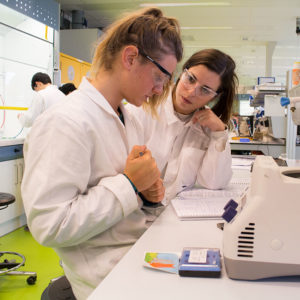
Webinar Teaching in University Science Laboratories
Sjors Verstege: Computers as teaching and learning support in laboratory classes
Laboratory education is a commonly used practice in natural science education and is generally
regarded as a vital component of a chemistry curriculum. Teachers have several goals for laboratory classes, including hands-on research experience, group work, broader communication skills, data collection and (error) analysis, planning, and laboratory report writing. However, many of these goals have been argued to be better accomplished outside the cognitively demanding learning environment of the laboratory.
Careful preparation for laboratory classes, such as practicing with the chemical concepts and data analysis skills, has proven to increase the quality of knowledge construction during laboratory classes. Virtual and simulated laboratories are valuable assets to prepare students for laboratory classes, and are also a convenient and effective replacement of laboratory classes, especially in contexts where the laboratory is not an option such as distance education.
During the webinar, I will discuss:
The potential of simulations to help students prepare for laboratory classes
How such simulations can be designed, following the design oriented research approach
The role that online platforms can play in the laboratory classes design (example Labbuddy platform)
The results of a case study performed at Wageningen University
Biography
Sjors Verstege is a 3rd year PhD candidate at Wageningen University, working at the laboratory of food chemistry. Before starting his PhD, Sjors obtained a BSc and MSc in Food Technology, with a minor in education. Sjors has 4 years of experience in educational development. His current project has 2 foci: The first is to design, implement, and evaluate virtual experiment environments (VEEs) that are used in undergraduate food chemistry education. The second is to analyse student behaviour in VEEs, and relating this to students’ learning outcomes and self-regulation.
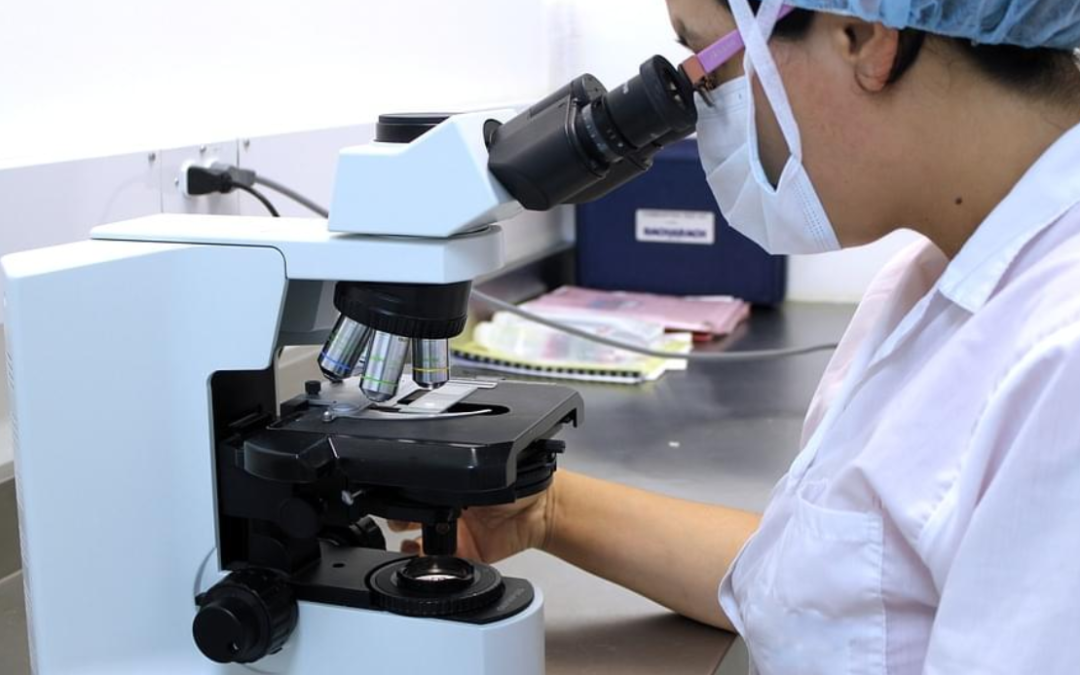
Nov 21, 2018 | News
The report of the 2nd Employment Survey for European Chemists (ESEC2) has just been published. The report, prepared by Reiner Salzer, Chair of the ECTN Label Committee and in cooperation with the European Chemical Society, analyses data received in 2017, from a total of 2754 chemists and chemical engineers and delves into the employment conditions and career opportunities for chemists in Europe. The report is freely available in Chemistry, a ChemPubSoc journal.
The ESEC2 is based on the experience of the first European employment survey (ESEC1) which was carried out in 2013, although both the questionnaire and the technology have been much reworked. The figures take a look at a variety of aspects, including education levels, career planning, job satisfaction, employment sectors and salaries. The conditions and opportunities are individually analysed for all countries with a stastistically significant number of responses. The results in turn provide important clues for careers in these countries, and in Europe as a whole. This is the first general evaluation of the survey and provides many details about the chemistry workforce in Europe and its development.
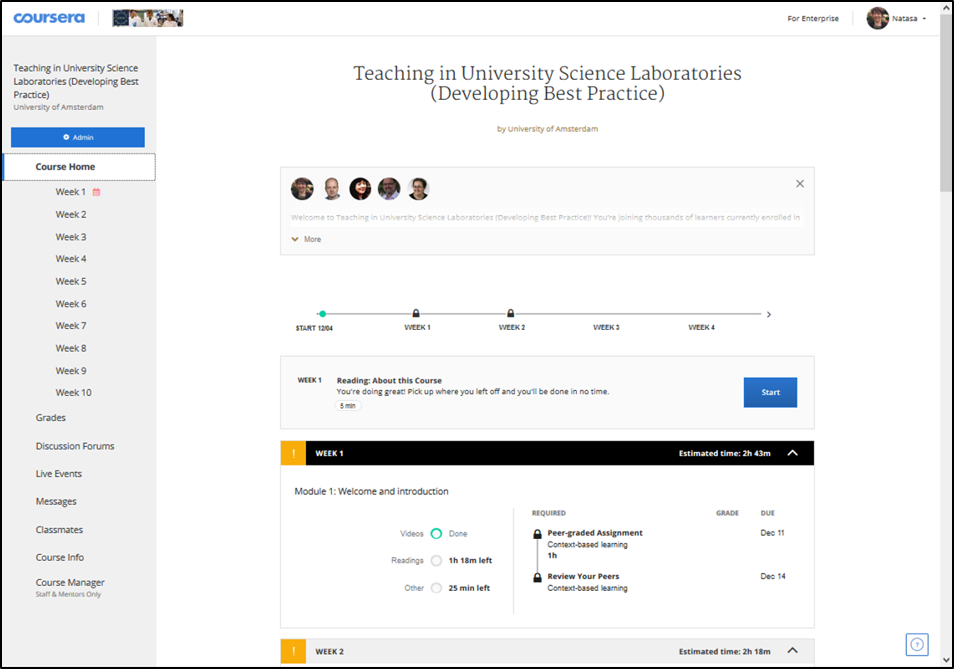
Oct 18, 2018 | News
The Lecturing Qualifications and Innovative Teaching Methods Working Group of ECTN is developing an online course for professional development of lecturers in laboratory courses entitled: Teaching in University Science Laboratories (Developing Best Practice). The Online course is delivered on the MOOC platform Coursera. The course is targeted at relatively inexperienced university teachers who teach in the lab courses. You can find a position paper about the course here.
The next course Teaching in University Science Laboratories (Developing Best Practice) will be given as a private online course on Coursera and will start on November 12 2018.
Download Leaflet about the Online Course November 2018
To apply for this course, please fill in the application form:
Application form
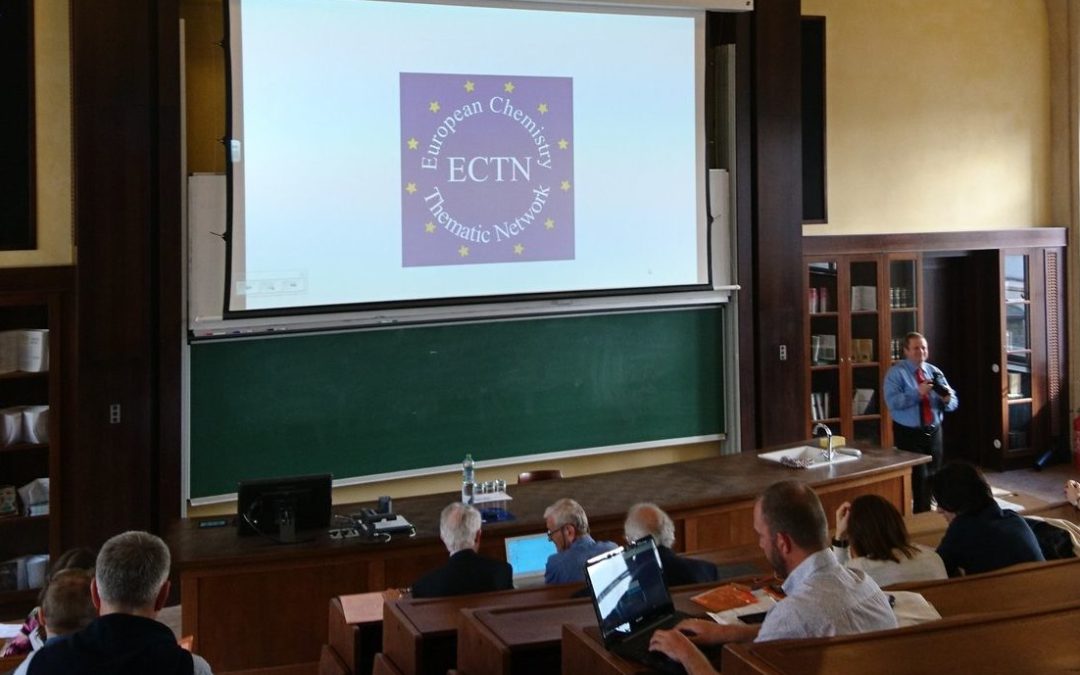
Apr 24, 2018 | News
The ECTN General Assembly took place in Prague on 18-22 April 2018 along with meetings of the ECTN Standing Committees and Working Groups. The Assembly was decidedly pan-European, with participation supported by chemists from the United States to Russia. The meeting was opened by Prof Pavel Matějka, the Vice-Rector of University of Chemistry and Technology, Prague and by Prof. Pilar Goya Laza, President of the European Chemical Society – EuChemS.
The invited plenary lecture on “IUPAC and its role in chemistry education and chemistry research activities” was given by Prof Chris Brett (IUPAC Vice President/President-Elect). Keynote lectures were given by Prof Reiner Salzer, ECTN Label Committee Chair on ‘’Employment survey news, collaboration with EuChemS and ACS’’ and by Dr Hugo Kittel, UCT Prague, Operational Programme Manager on ‘’Teaching project approach in technologically oriented subjects’’. Dr Lily Raines, Manager, Office of Science Outreach of the American Chemical Society (ACS) organised a workshop on ‘’ACS Chemistry Festivals’’, with many practical and entertaining chemistry experiments.
Prof Emmanuel Sinagra was sworn in as the new ECTN president and Prof Leo Gros was elected as Chair of the Standing Committee on Quality Standards in Teaching – a new Standing Committee. During the meeting there were broad discussions on the many ECTN activities, including the “accreditation” activity in the field of aw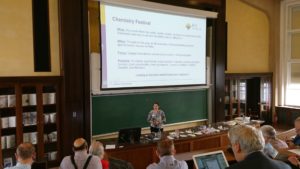 arding the “Eurolables” to quality chemical HEI programmes, the vast scheme of internet based chemistry examination tests “eChem Tests”, and the database “Mobicchems (Transparency)”, the latter which enables students to choose suitable study programmes abroad (e.g. for the Erasmus exchange stay).
arding the “Eurolables” to quality chemical HEI programmes, the vast scheme of internet based chemistry examination tests “eChem Tests”, and the database “Mobicchems (Transparency)”, the latter which enables students to choose suitable study programmes abroad (e.g. for the Erasmus exchange stay).
In addition, the video-based Module for teaching “Ethics to Chemists”, the Course for laboratory teachers “Teaching in University Science Laboratories”, the Lecturing Qualifications and innovative teaching methods were presented and discussed. And last but not least, the “student-oriented activities” that support the quality of education in chemistry at secondary school level was also presented and debated.
Prof Chris Brett, President-Elect of IUPAC, was awarded the Medal of the Czech Chemical Society, the highest award of the Society.
Pavel Drašar, ECTN Vice-President

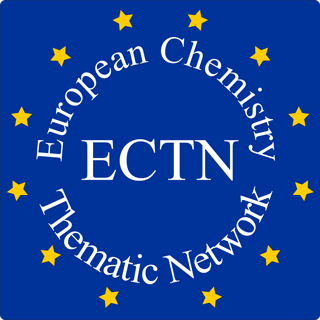
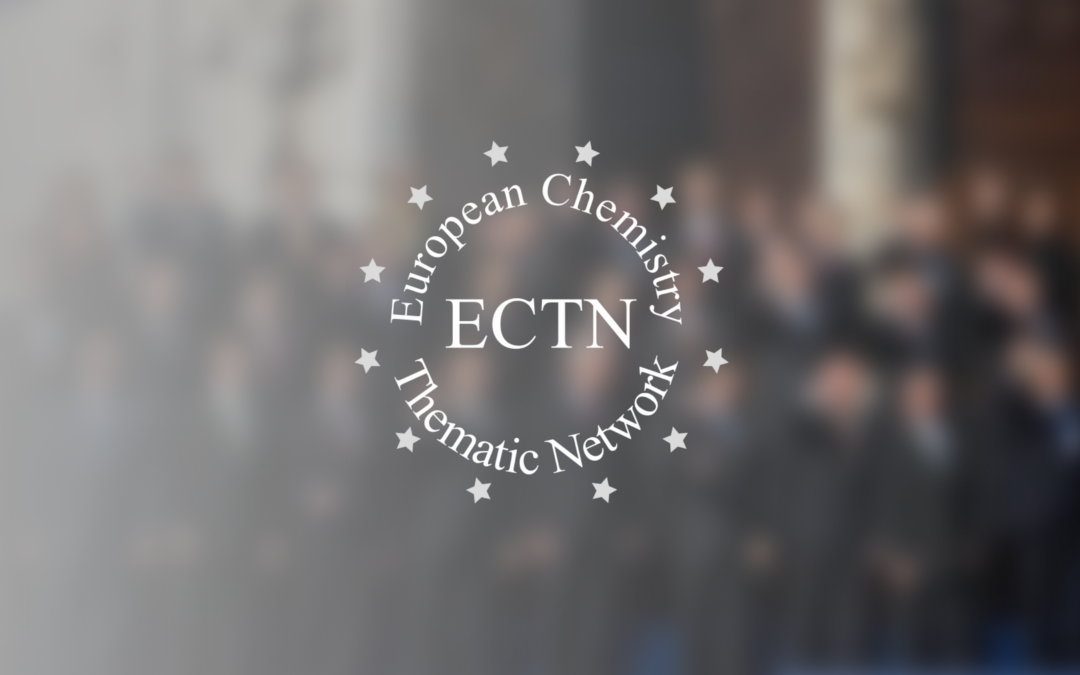




 arding the “
arding the “